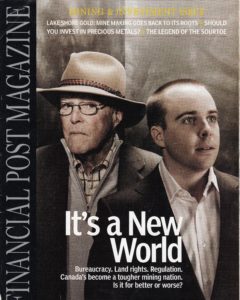The National Post is Canada’s second largest national paper. article was originally published in the Financial Post Magazine’s April, 2010 issue.
For an extensive list of articles on this mineral discovery, please go to: Ontario’s Ring of Fire Mineral Discovery
Ontario Premier Dalton McGuinty, who stated in a February news conference that “we are not going to succeed in Ontario by pulling stuff out of the ground,” has changed his tune. “There is a tremendous amount of excitement over the economic potential of the Ring of Fire,” says Michael Gravelle, Ontario’s Minister of Northern Development, Mines and Forestry.
In Bygone Days, Good Bush Gear And Decent Maps Were A Mining Firm’s Greatest Assets. Today, Regulation And Bureaucracy Rule The Industry. Is Canada Paying The Price?
Don McKinnon, a grizzled prospector from Timmins, Ont., sports a whopping gold nugget on his finger — proof of his prodigious finds. The 80-year-old owns a stake in the nearby Hemlo gold mine and is still very much a player in the Canadian mining industry. He remembers when the staking was hard and the regulations were easy. To get a leg up on the competition, the hoary miner wasn’t above “dirty tricks” like buying up all the mine ministry maps in town. McKinnon still displays the 40 pairs of snowshoes he bought in the winter of ’79 to thwart competing prospectors during the Hemlo staking rush, and tells tales of being stalked by polar bears in the Far North.
But ask him his thoughts on the industry today, and he simply growls: “it’s tougher.” These days, McKinnon leaves the finer points of the mining business to his 27-year-old son, Gordon, president of Canadian Orebodies Inc., which has large claims in the James Bay Lowlands. The younger McKinnon doesn’t spend nights in the bush with a pick-axe. To be a player, junior miners need ample knowledge of stock market and the ability to negotiate impact benefit agreements with First Nations. In Gordon’s case, the list also includes overseeing an survey on caribou migratory patterns — a project he funded as part of an exploration deal in northern Ontario.
While his father still relies on his massive collection of topographical maps, Gordon eagerly awaits Ontario’s new regulations that permit online mapping. It’s staking made simple, but at a price: more bureaucracy. He processes more paper in a week than his father did in a year. “Before, the government saw a new mine as a new revenue stream; now they put us through hoops,” says the younger McKinnon.
Mining was the early economic engine of this nation, and swaths of Bay Street’s wealth can be traced back to prior generations of wheeler-dealers.























